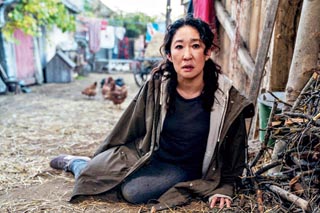The BBC America Emmy-winning series Killing Eve hasn’t powered to fandom through the usual means by which a web series generally does. For starters, even after its recently-aired third season finale, its genre still remains to be defined and lies somewhere within action-meets-satire-meets-romance. Then there’s the storyline pivoted around an MI6 agent (Eve Polastri played by Sandra Oh) chasing an international assassin (Villanelle/Oksana Astankova played by Jodie Comer) and the crackling chemistry they share. And then there are its three seasons that have led viewers guessing what can be expected with their distinctly different writing.
Season one, led by Phoebe Waller-Bridge as writer, instantly grabbed attention with the acting by its stellar cast and the subsequent season still kept the curiosity alive, though with a different writer. The third season, however, was distinctly different from the first two and focused more on Villanelle’s backstory.
For someone like me who has been a fan since the pilot episode aired in 2018, Villanelle’s story had always left me curious. Comer has played the vicious character with conviction and a convincing Russian drawl. Every gruesome murder Villanelle is shown committing as she casually jet-sets through Europe, is acted out by her with a psychopathic devil-may-care edge in her eyes and when she is seen chasing Eve, this same steely look changes into that of casual affection — and yes, even when she stabs Eve at the end of the second season.
The third season saw Villanelle go back to her mother in Russia and after a night of farm-style familial revelry set to Elton John’s Crocodile Rock, she leaves in her usual, chilling manner. But it’s interesting to note the focus laid on the notorious assassin’s humane side, asking viewers to almost feel sorry for her.
Just like Comer’s Emmy came as a surprise to nobody, the rest of the cast are magnificent in that typical, quiet but nuanced manner that I have often admired in British productions. Oh is brilliant as usual but Eve’s personal life outside of Villanelle didn’t seem to take up much of this season. Instead, we got to take a better look at Eve’s boss, Carolyn Martens, played by Fiona Shaw and Villanelle’s handler Konstantin, played by Kim Bodnia.
The third season has received mixed reviews but I would attribute it to the series taking a sharp turn towards showing the humane sides of a lot of its main characters. Therefore, the elements of shock and disbelief are less compared to the kind of attention that calculated detachment exhibited by its characters was achieving till the second season. But just when you start feeling a pang of sympathy for Villanelle, she leaves yet another of her victims to die, even as she races to meet Eve at London Bridge and plays out an ending fit for a romantic series, but only to an extent.
The ending is left open as Eve and Villanelle walk away from each other — albeit keeping an eye out for each other while doing so, leaving plenty of room for the next writer to take the series in any direction they please.











